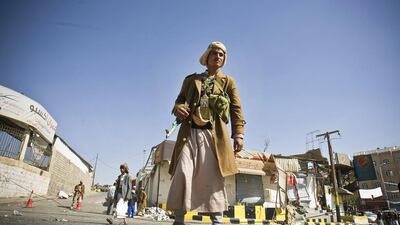SANAA // Houthi militiamen on Tuesday shelled the residence of Yemen’s president, Abdrabu Mansur Hadi, and occupied the presidential palace after clashes with guards.
The moves came after a ceasefire declared on Monday between government forces and the Houthis broke down amid the greatest political unrest in Yemen since Arab Spring protests in 2011.
With the attack on his residence subsiding late in the evening, Mr Hadi was left negotiating for his political survival, even after previous talks failed to resolve a bitter impasse over the country’s new constitution.
“It’s a new era in Yemen and presidents will continue to fall until they understand the role [Houthi leader AbdulMalik] Al Houthi must have,” said Abdullah Shaban, a Houthi chief.
On Monday, Houthi militiamen expanded their control over the capital to areas around the presidential palace following clashes with government troops. During the ceasefire, they resupplied and set up additional checkpoints throughout Sanna. On Tuesday morning, the city streets were quiet, but tense, with most residents remaining indoors.
Yet, by the late afternoon, negotiations with the government collapsed and the Houthis resumed attacks, quickly entering the presidential palace and shelling Mr Hadi’s residence, where the president was said to be holed up.
While the Houthis have not formally asked Mr Hadi to relinquish power, the attacks — which government troops were unable to counter — were meant to assert their position as the true powerholders in Yemen.
The Houthis emerged as the dominant force in Yemeni politics after seizing most of Sanaa last September.
The group’s leader, AbdulMalik Al Houthi, is believed to prefer ruling indirectly, by exerting influence rather than holding political office, seeking to emulate a leadership style similar to that of Iran’s Ayatollah Ali Khamenei.
Following the Houthis’ initial takeover of the capital, Mr Hadi stayed on as president, but the group made frequent public displays of their power.
In October, they rejected Mr Hadi’s choice for a new prime minister in favour of an independent candidate agreed upon by all sides.
The group also created armed “resistance committees” that were stationed at the central bank, transportation hubs, and key government ministries. Loyalists were appointed to senior government positions, including as advisers to Mr Hadi.
The breaking point appeared to come last week when the government moved forward with a draft constitution that saw Yemen divided into a six-region federation.
The Houthis want the country to become a two-region federation and accused Mr Hadi of imposing his own agenda on the country.
Last Saturday, they abducted Mr Hadi's chief of staff, Ahmed Awad bin Mubarak, a key backer of the six-region constitution. After Mr Hadi refused to give into their demands and oil production was stopped in a key province to protest the kidnapping, Houthi militiamen poured into Sanaa and battled government forces.
Along with disagreements over the constitution, the Houthis also fell out with Mr Hadi over his partnership with foreign powers such as the United States.
“Yemen needs a ruler that puts Yemen first and is not affiliated with foreign powers,” said Zakaria Al Shami, a Houthi leader who was appointed deputy commander in chief of Yemen’s Armed Forces one month ago.
“It needs an army that is independent and works for its people. Any candidate for power who violates these vital points will be ousted.”
Mr Hadi’s government worked with the US to counter Al Qaeda in the Arabian Peninsula (AQAP), which has plotted to carry out attacks on foreign targets from bases in Yemen’s south and east.
“President Hadi’s actions this week were the result of advice he took from regional powers who don’t want the best for Yemen. These regional countries seek to damage Yemen completely,” said Mr Al Shami.
While the Houthis have battled Al Qaeda militants as they expanded into provinces south of Sanaa, the group claims to see the US as the greater enemy.
“Six US surveillance planes were flying above Sanaa while forces clashed. Allowing this is one reason president Hadi must leave power,” said Osama Sari, a senior Houthi official.
As the Houthis launched their rapid offensive last year, some of Mr Hadi's advisers alleged they were aided by former president Ali Abdullah Saleh, who was ousted following mass demonstrations in 2011. Mr Saleh was said to retain influence among some military commanders who chose not to confront the Houthis.
There are suspicions that Mr Saleh may be plotting a return to power, either for himself or his son. However, Houthi officials said that while Mr Saleh is a political ally, their agenda does not involve him.
For the moment, Yemen does not appear to have any political candidates who are sufficiently unifying to stabilise the country.
Elections are scheduled this year for the presidency and house of representatives, but the Houthis are likely to try and seek influence over candidates from behind the scenes.
Members of established political parties in Sanna are now concerned that unchecked Houthi power could spell the end for democracy in Yemen.
Abdullah Noman, Secretary General of the Nasserist Unionist People’s Organisation said the government is to blame for the Houthi success.
“Houthis are in control of everything in Yemen and that is because no one stood up to them. They will lead the country into chaos,” said Mr Noman.
foreign.desk@thenational.ae
* with additional reporting by Associated Press

